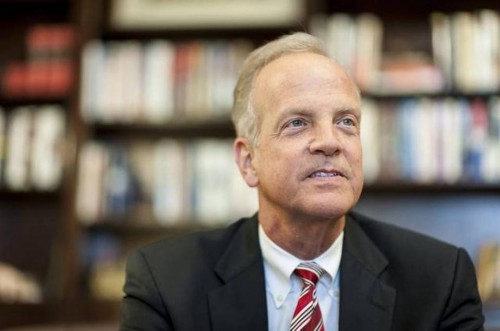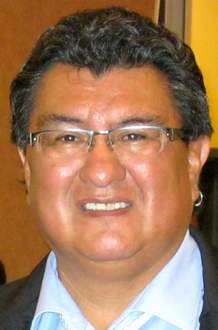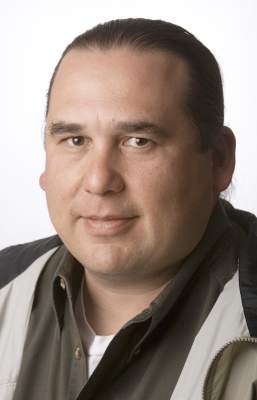You want tribes, especially ones that are struggling, to be bold in taking advantage of self-determination opportunities.
Yes, that’s right. Make no mistake: I know how difficult it is. When you’re poor, you’re poor. It’s hard to come up.
Is the Congress being bold enough in pushing new economic endeavors?
No, and part of it has to do with the economic constraints we have on us due to the debt, wars, and everything that has transpired over the last 15 years. There are limited opportunities now, but we need to take advantage of the limited opportunities that we have.
Does this situation change for the better while you are serving in Congress?
Well, I hope so. But this is a pretty dysfunctional place. I wish I could tell you this place is running like a Singer sewing machine, but it ain’t. It’s pretty tough. We can have the best ideas, and somebody will put a hold on them, and then that’s that. But that doesn’t mean you don’t keep trying. And, by the way, if you keep trying, I think that sets a really good example for the folks in Indian country.
Is the administration being bold enough on tribal economic development?
I think they’re pretty good, but they’ve got a ways to go yet, too. I think they’ve done some really good work, but they are under the same fiscal constraints that we are.
Would you support the president creating a Cabinet level Native affairs position?
I think, absolutely, it would be a great idea. Number one: they would have a better understanding of the challenges in Indian country than I would. Second: that voice out there talking about what needs to be done is important because it not only helps Indian folks, it helps everybody.
Jodi Gillette and other advisors in this administration focused on Indian issues are not Cabinet level.
I tell you, Jodi Gillette has as much influence right now as any Cabinet person. She’s got the president’s ear. I think, regardless of what the position is called, you have to have someone that the president trusts and will listen to.
Would you like to see the president create a tribal economic development council composed of Indian leaders?
I think it’s a good idea. If in fact this is something that can happen, we will talk about it as a committee, and send a letter off.
You’ve said your clean Carcieri legislative fix that would help reservation economies still faces a lot of hurdles.
Yes, and it’s no different now than ever before.
What does that mean?
That means that we’ve got to find 60 votes, and there are people out there on the Democratic side who don’t like it, and I’m sure there are people on the Republican side who don’t as well. This is truly going to have to be a bipartisan effort, or it isn’t going to work to get a clean fix. Our challenge is going to be finding those 60 votes. I think a clean fix is the way to go, but I am not stupid about the legislative process. We need to get it through. I don’t think that two classes of Native Americans is a good idea. So we’ve got to find the 60 votes. We’ve got to do some serious talking with Sens. [Dianne] Feinstein, Jack Reed, [Chris] Murphy, [Richard] Blumenthal – these are all friends of mine – to let them know that I do not see the boogeyman out there in this bill that they do. We’ll see how effective I am in that.
Three SCIA chairmen before you have said the same thing about trying to build a coalition—
It’s never happened.
What makes you the one?
I’m a better guy. [laughs] No, I don’t know. A lot of it is timing; a lot of it is luck, too. Just as everything else, you push forward, and maybe the key will fit the lock.
So you’re working your Democratic friends?
We haven’t started yet. We’ve passed it out of committee. I have not had the hard conversation with Dianne [Feinstein] or any of the other four.
What is the hard conversation?
The hard conversation is to sit down with them and say I want to make this real. We need to figure out a way to allay their fears. If we’re successful in doing that, fine. If it comes to a point that we can’t be successful, then it becomes a little more difficult. Feelings get hurt and all that stuff. But I think that we’re all grownups here, and I think this issue has been around long enough that we should be able to get to the root problems and get them resolved.
Your vice-chair, Sen. John Barrasso (R-Wyoming), how important is he in all this?
He is very important. He and [Sen. Jerry] Moran [R-Kansas] are the two keys to this puzzle. Moran because he is a co-sponsor. And if Barrasso were to come out hard against it, it would make this thing very difficult to pass.
In your ideal world, would he be working arm and arm with you on this?
In my ideal world, he would be.
And he’s not?
Well, we haven’t had that conversation yet, either. I don’t know where he’s at. I know where Jerry is. And Jerry is willing to go to the mat for us. Hopefully he will go to the mat with Barrasso. At the very least, Barrasso has to be neutral. If he’s opposed to it, we’ve got a problem. We don’t absolutely need him, but it would make life easier if we have him.
In committee, Sen. Barrasso recently proposed an amendment to study Carcieri and its effects on tribes, and it passed. More study?
Yeah, that’s something we do here all the time. We study stuff all the time, and then we study it some more. I think Carcieri is a known entity, and I don’t think it necessarily needs to be studied anymore.
Turning to your focus on Native education, all these hearings—is it because you were a teacher?
Yes, I think that’s fundamentally the root of it all. My folks strongly believed in public education, that it was a key to success. My grandmother moved to this country because of education. My mother and her three sisters and brother got degrees. Both my brothers have degrees. Education was pound into us as being very important. It is the key to our democracy. It is the key to economic development. It is the key to our future. If we are able to unleash the minds in Indian country, Indian country will flourish.
And you have proposed a Native language restoration bill. I know you didn’t grow up speaking a Native language, so why was that component meaningful to you?
It’s because of the information I have learned since sitting on the committee. Native language speakers do better in school, and they stay in school. Those are two big problems in Indian country—academic achievement and dropping out. If we can fix those two with language, we need to push language.
You held a higher education hearing that pleased many Indian higher ed advocates because they have felt their issues have been neglected by the administration to date.
It’s low hanging fruit, from my perspective. Tribal colleges are sitting there, ready to give skills to people to fill the jobs that are needed in Indian country. I think the tribal colleges are a huge asset. We are very fortunate in Montana because all seven tribes have tribal colleges. If we are able to leverage that tribal college system throughout the country, it will help with unemployment rates.
Over at the Indian Health Service, is Dr. Yvette Roubideaux going to be re-confirmed as director?
I don’t know. I think there are some communication issues that need to be worked out, and I’ve told her exactly that. There needs to be a lot better communication between tribes and her. I think she is trying to do that. But the well may be a bit soured because there are a lot of Native folks out there who don’t like her. I believe from a personal standpoint that I don’t have a problem with her. She is a delightful woman. But the Indian Health Service is in tough shape, and there needs to be the leadership there that pushes the envelope and listens to the people on the ground—tells them no when they have to tell them no, but comes up here and tells us [Congress] no when we need to hear that, too.
The reason I say I don’t know if she’ll be confirmed is I don’t know if she has the votes on the committee. That’s the problem. By the way, when Sylvia Burwell [the new director of the Department of Health and Human Services, and Roubideaux’ new boss] was in here, I talked to Sylvia specifically about her and asked her to do an assessment.
At the Department of the Interior, Assistant Secretary Kevin Washburn has pushed some progressive proposals lately – improving the federal recognition process, wanting to get lands put into trust for Alaska tribes, thinking about Native Hawaiian recognition – what do you think about all that?
I think it’s very, very, very good. I think Kevin Washburn is a great guy. I wish other members of the agency would push us harder at the congressional level, because I think there are people here who want to be pushed harder. [Sen. Heidi] Heitkamp [D-N.D.] is a prime example. I’m a prime example. If you come in and demand more, we’re probably going to deliver more.
This interview has been edited and condensed for clarity.















